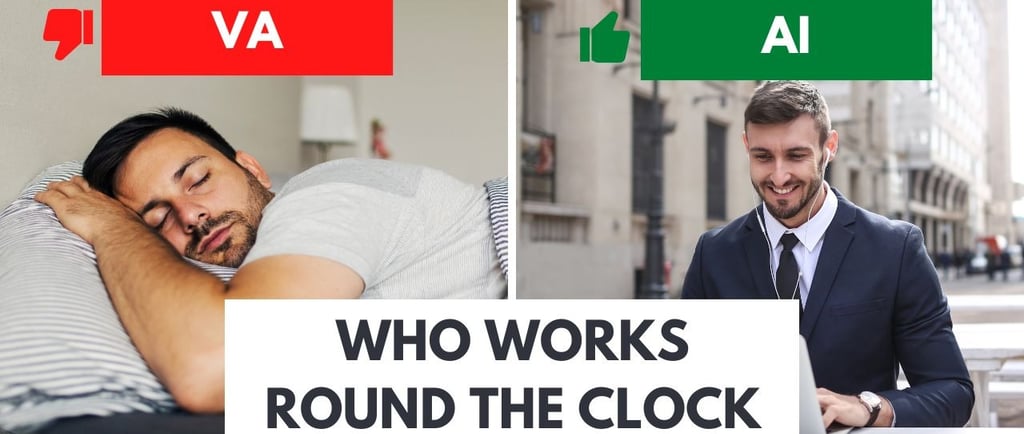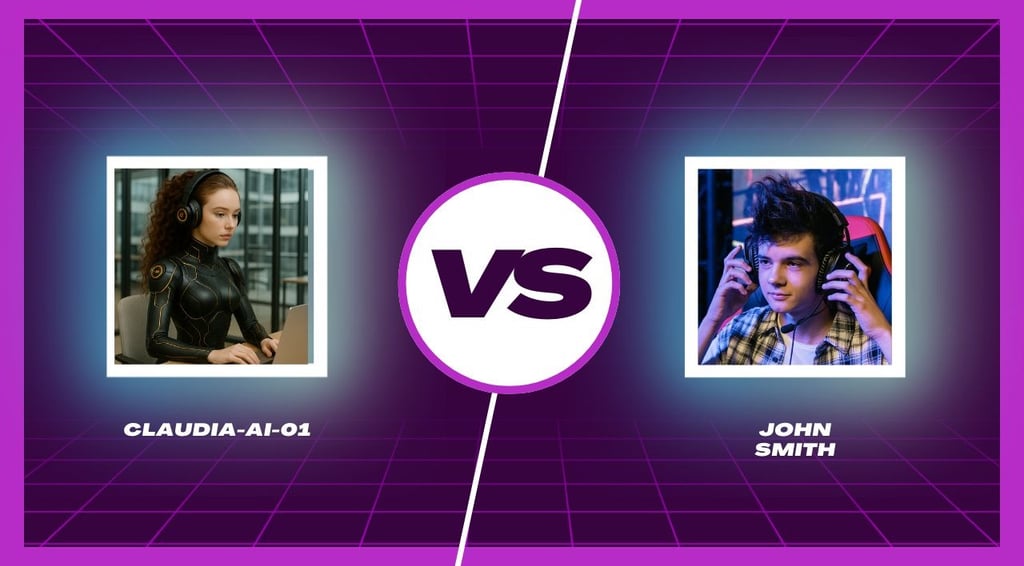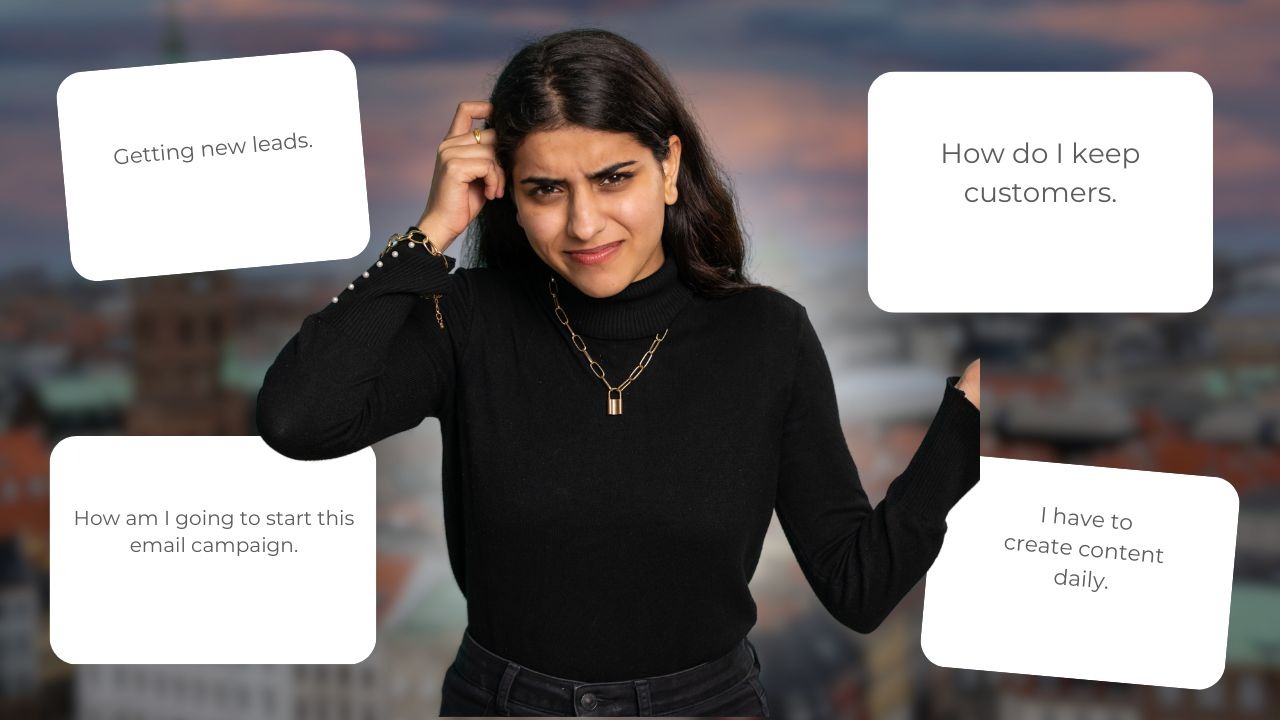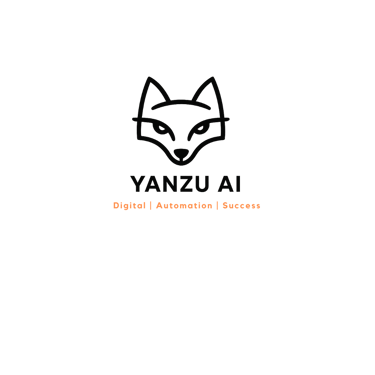AI vs VA vs Agency: Who Should Do What in a Small Business?
8/17/20255 min read


When it comes to deciding between AI, a Virtual Assistant (VA), or an agency for your small business, each option presents distinct advantages and is suitable for various scenarios. Here is a concise overview to help solopreneurs and small business owners determine their best choice:
AI:
Automates repetitive tasks efficiently.
Offers data-driven insights for decision-making.
Available 24/7, enhancing operational flexibility.
Cost-effective for performing automated tasks.
Ideal for those seeking scalability without significant overhead.
Virtual Assistant (VA):
Provides personalized support tailored to specific tasks.
Increases productivity through task management.
Cost-friendly alternative to dedicated employees.
Fosters human interaction, which can be vital for customer relations.
Best suited for tasks that require a human touch, such as personal assistance and client communication.
Agency:
Brings expertise and specialized knowledge to specific areas.
Offers comprehensive services across different business functions.
Great for businesses requiring ongoing support without permanent hires.
Delivers higher quality output due to expert teams.
The right choice for larger projects that need strategic planning and execution.
Ultimately, the decision between AI, a VA, or an agency depends on your unique business needs, budget, and the specific tasks at hand. Consider these factors carefully to make an informed selection that aligns with your operational goals.
The Short Answer
In the landscape of small businesses, understanding the distinctions between Artificial Intelligence (AI), Virtual Assistants (VAs), and Agencies is crucial for making informed decisions regarding operational efficiency. Each option caters to different needs and brings its unique strengths to the table. For those seeking quick, automated solutions for repetitive tasks, AI is often the most suitable choice. AI systems can streamline processes such as data entry, customer service responses, and appointment scheduling, allowing small business owners to focus on strategic tasks without the need for human intervention.
On the other hand, Virtual Assistants provide more personalized support. A VA is ideal for entrepreneurs requiring assistance with administrative tasks, social media management, or customer relations. They bring a human touch to the operations, fostering engagement with clients while handling day-to-day responsibilities. This makes VAs a good fit for solopreneurs or small business owners who value flexibility and the personal interaction that a human assistant can provide.
Agencies, however, offer a broader range of expertise and resources. They are best suited for small businesses looking for comprehensive solutions in areas such as digital marketing, graphic design, or web development. Agencies can manage campaigns and projects of varying complexity, which allows small business owners to leverage specialized knowledge that may not be available in-house. This option is particularly beneficial for businesses aiming to scale quickly or needing advanced strategies.
Ultimately, the best choice will depend on the specific business tasks at hand and the preferences of the owners. Evaluating the scale of the work, budget constraints, and the level of personal interaction desired will facilitate a more tailored decision, aligning the chosen solution with the overall business objectives.
Understanding AI Tools, Virtual Assistants, and Agencies
In today’s digital landscape, small businesses have access to various tools and services designed to streamline operations and enhance productivity. Three primary categories to consider are AI tools, Virtual Assistants (VAs), and agencies, each serving unique functions within a business context.
AI tools, or artificial intelligence tools, are software applications designed to perform tasks that typically require human intelligence. They can analyze data, automate repetitive tasks, and even provide insights for decision-making. For instance, an AI-powered chatbots can handle customer inquiries in real-time, providing instant support without human intervention. Additionally, AI tools can optimize marketing campaigns by analyzing customer behaviors and suggesting targeted strategies, ensuring businesses effectively reach their audiences. However, while AI can process large volumes of data and perform automated functions, its inability to understand nuances or emotions may limit its effectiveness in complex customer interactions.
Virtual Assistants, commonly referred to as VAs, are individuals who provide remote administrative, technical, or creative assistance to businesses. VAs can handle tasks such as managing email correspondence, scheduling appointments, and conducting research. For example, a VA can take charge of managing a social media calendar, crafting posts, and responding to comments, freeing up the business owner to focus on core areas. However, the effectiveness of a VA often hinges on clear communication and task specifications, as a VA may not possess in-depth knowledge of certain specialized areas.
Lastly, agencies are firms that offer targeted services across various domains such as marketing, design, and public relations. They typically employ a team of experts to deliver comprehensive solutions to businesses. For instance, a marketing agency might develop and execute a full-fledged advertising campaign, including creative content, strategic planning, and performance analytics. However, working with agencies can be more expensive and may require longer timelines, as their processes often involve multiple stages of review and collaboration.
By understanding the distinct capabilities and limitations of AI tools, VAs, and agencies, small business owners can make informed decisions about which resources provide the most value for their specific needs.
Trade-Offs: Cost, Speed, Quality, Control, Risk
In the realm of small businesses, selecting the right resources is pivotal, and the choice between artificial intelligence (AI), virtual assistants (VAs), and agencies involves essential trade-offs including cost, speed, quality, control, and risk. Each of these options presents unique advantages and disadvantages that can significantly impact operational effectiveness.
Cost is often the primary consideration for small business owners. AI solutions typically offer long-term savings, reducing labor costs as they can automate tasks at scale. Conversely, virtual assistants often come with flexible pay structures that can be more manageable for small operations, particularly as they can work part-time or project-based. Agencies, while usually more expensive, provide comprehensive services that might justify the higher cost if their expertise matches the business's needs.
Speed of execution is another critical factor. AI systems are capable of processing vast amounts of data and performing tasks almost instantaneously, potentially providing a swift turnaround on projects. On the other hand, VAs may operate more slowly as they engage in tasks requiring a higher degree of human input. Agencies can vary widely in their response times depending on their workloads and resource availability. Therefore, a small business must carefully assess which option aligns best with their urgency.
Quality of output is also paramount. AI can produce remarkably consistent results, but the effectiveness heavily relies on the quality of the underlying algorithms and data. VAs provide a human touch but may vary in quality based on individual competencies. Agencies typically uphold higher quality standards due to their specialized teams, yet they also vary, making diligent research essential. Control over task execution is another dimension to consider; businesses might retain more direct oversight with VAs and AI, while agencies may operate with more autonomy.
Finally, the risk involved in these choices needs scrutiny. While AI presents risks related to reliability and continuity, utilizing VAs mitigates the risk of over-dependence on technology but can lead to interpersonal challenges. Agencies, though typically experienced, can introduce risks regarding alignment with the business's strategic goals. A careful evaluation of these trade-offs will empower small business owners to make informed decisions, striking a balance that suits their specific operational landscape and budget constraints.




Need a custom AI assistant. We have great custom GPT chat Bots to help you with your marketing needs.
Visit our store and start generating sales.


